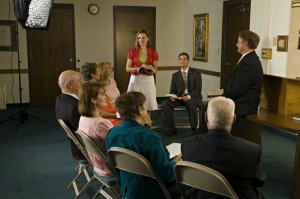I marvel at the way the Brethren of the Church conduct themselves. There is something different about the way they behave and interact with others that sets them apart. Recently I met a man I will call The Voice of Reason. My wife and I ate with The Voice of Reason at every meal for a week. At first I was impressed with how friendly he was, and how well traveled and well versed he was. It wasn’t until about three days in that I began to see a pattern in all our conversations. As I thought about how our conversations went I began to notice that there were some distinct differences between how a conversation went with The Voice of Reason, and a conversation with one of the Brethren. This got me thinking about the character traits that identify a person with spiritual maturity.
Signs of Spiritual Maturity
-
Knowing it All
 Sometimes we make mistakes. Sometimes we should admit when we don’t know something. As we carried on our conversations at the dinner table, I noticed a pattern with The Voice of Reason. He was very careful to make sure that you knew that his understanding surpassed yours. He was not boastful about it, but no matter what instance was related by someone at the table, he had an example of how he had experienced that also or had at least had some pithy social point to make that showed how well he understood the underlying point.
Sometimes we make mistakes. Sometimes we should admit when we don’t know something. As we carried on our conversations at the dinner table, I noticed a pattern with The Voice of Reason. He was very careful to make sure that you knew that his understanding surpassed yours. He was not boastful about it, but no matter what instance was related by someone at the table, he had an example of how he had experienced that also or had at least had some pithy social point to make that showed how well he understood the underlying point.
The spiritually mature don’t feel a need to play the game of one-upmanship. It is okay to let someone relate a story without having to demonstrate your own level of experience in the area of discussion. You can learn a lot from someone and about someone by just being quiet and listening. When asking questions, just seek for understanding of their situation for the sake of understanding, not so that you can impress them with your own matching example.
-
Tolerance
Someone at the table was justifiably upset and frustrated with the level communication and service that was taking place, and she expressed to our guide her frustrations, detailing the attempts she had made to get answers and get correct information, without success. For the next ten minutes The Voice of Reason very gently, but persistently reviewed reasons why this woman might need to be more patient, why the business probably did what it did, and basically tried to school her in what her emotions and response should have been. This was done, of course, as only The Voice of Reason could do it.
In the Church, in any congregation, and for that matter, in any classroom, you will find every conceivable level of spiritual maturity. There are those who are serious about their gospel study, those who only attend Church as a social function, and are not even aware that this is why they attend. You have those who are faithful, but clueless about even the basic doctrines, living by the most simple of faith. There are those whose faith is based on intellectual justifications of the doctrinal and historical facts of the Church, and those who have not learned how to view the gospel from an eternal perspective, and don’t see past this week, let alone this lifetime.
It is important to learn to let people feel what they feel, and believe what they believe without feeling the need to correct, censure, educate, or forgive them for having this or that opinion. Someone who is spiritually mature accepts where a person is, and understands that this person has a certain view of the gospel or sees life a certain way. This is not a threat to the spiritually mature person. It is like a parent understanding that their teenager is not always thinking rationally, and that they often react emotionally. This is not a weakness, but a fact of where they are in their progression. As they experience life they will learn new lessons and hopefully awaken to the need to progress deliberately rather than by accident.
There is plenty of opportunity to preach, expound, exhort, and teach truth in the Church. Sometimes we just need to let things happen. The Lord’s hand is always working in each of our lives to assist us and teach us and school us in what we need. Forcing a sermon down someone’s throat is not often the best method for helping our brothers and sisters to mature and grow in the gospel.
-
Being Gracious
 If you have ever had any experience with the general officers of the Church you probably have seen how gracious they are. They are not easily offended. They are not demanding. They are grateful for what they are given and for what is done for them. They express their gratitude. If someone makes a mistake, unless they feel a need to correct the person, the mistake is ignored. When they find a teaching moment they are kind about it. If they are pointed about something they have to say to a person or to a group of people, there is good reason behind it. I have seen President Boyd K. Packer condemn and chastise an entire assembly of priesthood brethren, but only after he gave them ample opportunity to show that they were more spiritually mature than they proved themselves to be. He pointedly told the assembly that he had many things he had wanted to teach, but we had shown that we were not ready to receive them, so he completely changed the program and did something else. That hurt. You could tell that he wasn’t angry, but he was very disappointed.
If you have ever had any experience with the general officers of the Church you probably have seen how gracious they are. They are not easily offended. They are not demanding. They are grateful for what they are given and for what is done for them. They express their gratitude. If someone makes a mistake, unless they feel a need to correct the person, the mistake is ignored. When they find a teaching moment they are kind about it. If they are pointed about something they have to say to a person or to a group of people, there is good reason behind it. I have seen President Boyd K. Packer condemn and chastise an entire assembly of priesthood brethren, but only after he gave them ample opportunity to show that they were more spiritually mature than they proved themselves to be. He pointedly told the assembly that he had many things he had wanted to teach, but we had shown that we were not ready to receive them, so he completely changed the program and did something else. That hurt. You could tell that he wasn’t angry, but he was very disappointed.
-
Being Careful in Speech
One who is spiritually maturing begins to see that what we say does have a profound effect on others. Being loose with our lips and careless with our opinions and words more often than not causes offense or hurts feelings. Being careless with our opinions, especially if we are loud about it, also shuts down any expression of opinion by those who are less vocal or don’t feel as confident about their opinion as we do. Much of what we learn in the Church comes from voicing our beliefs. When we bear our testimonies our testimonies grow. When we verbalize our opinions about a story or doctrine of the gospel in a class, we learn more about how we really feel about that belief or doctrine. It also exposes our weaknesses and the holes in our learning.
Those who teach in the Church should be especially careful about how they react when someone says something that seems completely off the wall. If we want people to participate in our classes or in discussions, we need to make it safe for them to say what they feel without shutting them down. How can a teacher ever learn what the class really believes if everyone in the class but the know-it-alls are afraid to say anything. I have taught classes of high priests and heard things about the Spirit and the doctrines of the gospel that were amazing to me. But if you cannot keep a straight face when you hear something that is completely unfounded in truth, you run the risk of not ever hearing from that person again. If they don’t talk to you as the teacher then you have a much harder time knowing what they need to learn so they can progress in the gospel.
-
Allowing for Differences
 An important part of our spiritual maturity is being able to allow for and accept different points of view and for different levels of understanding of doctrines. This can get messy in a class discussion. There is a difference between openly accepting every opinion and expression of doctrine as okay to have and encouraging all those opinions to be expressed, but teaching the truth.
An important part of our spiritual maturity is being able to allow for and accept different points of view and for different levels of understanding of doctrines. This can get messy in a class discussion. There is a difference between openly accepting every opinion and expression of doctrine as okay to have and encouraging all those opinions to be expressed, but teaching the truth.
It is important for the members of the Church to express their opinions and feelings about their understanding of the doctrines of the gospel, but it is also important that the teachers in our classes understand what the truth is and teach that truth in a non-offensive way. One example of a doctrine where this is often difficult is the Word of Wisdom. Any discussion of the Word of Wisdom is a veritable emotional powder keg. If not handled carefully and lovingly, and teaching and addressing only what the Brethren have specifically taught, the teacher could have the whole lesson blow up in his/her face.
Most doctrines have various levels of understanding. There is the letter of the law, and the spirit or intent behind the law. The letter of the law is usually pretty straight forward, except for the Word of Wisdom, and there are those that will argue with me about that. Then there is the spirit or intent of why that law is important, why it was given to us, what it means, how best to live it, and how far we should go in living it. The spiritually mature person recognizes that we are all in a different place spiritually, and will teach the truth then let the Spirit guide each person toward a deeper commitment to that truth.
-
Confidence
Like my Voice of Reason example, there are always those who portray themselves as being confident in their conversations. But there is a big difference between someone who is confident sounding, and someone who has the conviction of the Spirit behind their confidence. A spiritually mature person speaks with confidence because they have had the Spirit confirm truth to their souls. This confidence gives them the ability to sound and be confident in what they say and how they act.
It often takes a while observing a person before you are able to really feel comfortable that what they portray as confidence comes from spiritual conviction rather than from just being a know-it-all. If they are like most of us, we are a mixture of both until we finish maturing.
-
Scriptural Knowledge
One cannot be spiritually mature without a sound understanding of the scriptures, which is where we get our understanding of the doctrines of the gospel. Just being able to quote scripture does not indicate spiritual maturity. But being able to discuss all the scriptural places that back up one’s understanding of the gospel principle is a good sign of spiritual maturity. When I was in college we would occasionally have the Stake Patriarch come and speak to us in the institute building. He never brought his scriptures, but he would quote them, chapter and verse for hours as he taught us the gospel. We would look them up and follow along as he would quote them.
 Being able to quote scripture for hours is not necessarily an indication of spiritual maturity, but it certainly shows that the person has spent time in the scriptures. Knowing what the Lord and His servants have said is critical to coming to an understanding of spiritual things. The only other method for learning what is needed is to have everything revealed to us personally. That is not only the hardest way to do it, but is impractical, since the Lord took thousands of years to reveal the knowledge found in our current scriptures. Let’s take advantage of what has already been given us. It is much easier to ask for a confirmation of revealed truth than to figure out which truth needs to be revealed to us next.
Being able to quote scripture for hours is not necessarily an indication of spiritual maturity, but it certainly shows that the person has spent time in the scriptures. Knowing what the Lord and His servants have said is critical to coming to an understanding of spiritual things. The only other method for learning what is needed is to have everything revealed to us personally. That is not only the hardest way to do it, but is impractical, since the Lord took thousands of years to reveal the knowledge found in our current scriptures. Let’s take advantage of what has already been given us. It is much easier to ask for a confirmation of revealed truth than to figure out which truth needs to be revealed to us next.
Spiritual maturity is not a matter of knowing facts and figures about gospel matters. The spiritually mature person has learned to be forgiving, gentle, knowledgeable, tolerant, accepting, patient, and loving of others. As you think about those you have met you consider to be spiritually mature, what other character traits have you noticed they possess?
About Kelly P. Merrill
Kelly Merrill is semi retired and writes for https://gospelstudy.us. He lives with his wife in Idaho. His strength is being able to take difficult to understand subjects and break them down into understandable parts. He delights in writing about the gospel of Christ. Writing about the gospel is his personal missionary work to the members of the Church and to those of other faiths who are wanting to know more about Christ's gospel and His Church.



This is a wonderful article. Gauging it by th spiritual maturity characteristics listed, the author seems to be well on his way. It has the feel of gentle teaching and truth.
I am a little confused. While I love this article, who is it written by? The blog says, by Kelly P. Merrill | Jul 8, 2014 | Kelly P. Merrill–Prophets and Their Teachings. Your statement says it was written by someone else. Please clarify.
Oh, thank you, Robert! I got confused; it was EDITED by Terrie Bittner, but written by Kelly. Thanks!
Thank you Deborah. When I wrote the article I was thinking of those whom I admired in the gospel. I was thinking of what character traits they had developed that I still needed to work on.
Not quibbling with most of your points, but one of the first signs of gospel maturity that comes to my mind is the attitude that allows one to quit seeking for signs of gospel maturity.
But maybe I’m taking D&C 63:7 and the surrounding verses out of context.
Hi Joel,
Thanks for reaching out! I’m not exactly sure what you mean here; I would agree that we shouldn’t judge where someone is spiritually, but likewise, it’s good to have spiritual role models and people whose testimonies you admire and trust.
The scripture you’re referring to, however — at least to my understanding — is associated with seeking for signs from God (think Korihor from Alma 30). In fact, the footnotes take you to a passage in Mark that details the Pharisees wanting a sign, or physical manifestation, of Christ’s divinity.
I think the author of this post was advocating the characteristics of someone who is spiritually mature so that we can each question ourselves, “Do I have this characteristic?” Then if not, we can work on it.